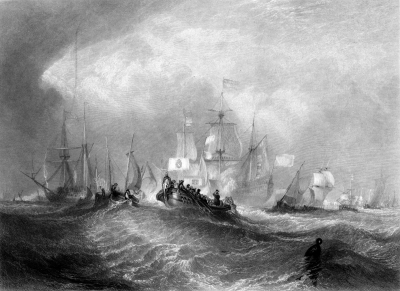The Battle of Killiecrankie (Scottish Gaelic: Blr Choille Chnagaidh), also referred to as the Battle of Rinrory, took place on 27 July 1689 during the 1689 Scottish Jacobite rising. A Jacobite force under John Graham, Viscount Dundee, defeated a government army commanded by Hugh Mackay.
James VII went into exile in December 1688 after being deposed by the Glorious Revolution in Scotland. In March 1689, he began the Williamite War in Ireland, with a simultaneous revolt led by Dundee, previously military commander in Scotland.
Hampered by lack of men and resources, Dundee gambled on a decisive battle which he hoped would attract wider support. Although Killiecrankie was an unexpected and stunning victory, his army suffered heavy casualties and he was killed in the final minutes. It did little to change the overall strategic position, and the Jacobites were unable to take advantage of their success.
The Glorious Revolution of November 1688 (Irish: An Réabhlóid Ghlórmhar; Scottish Gaelic: Rèabhlaid Ghlòrmhor; Welsh: Chwyldro Gogoneddus), the invasion also known as the Glorieuze Overtocht or Glorious Crossing by the Dutch, was the deposition of James II and VII, king of England, Scotland and Ireland and replacement by his daughter Mary II and her husband, William III of Orange, stadtholder and de facto ruler of the Dutch Republic. A term first used by John Hampden in late 1689, historian Jeremy Black suggests it can be seen as both the last successful invasion of England and also an internal coup.Despite his Catholicism, James became king in February 1685 with widespread support as many feared his exclusion would lead to a repetition of the 1638–1651 Wars of the Three Kingdoms. Over the next three years, he alienated his supporters by suspending the Scottish and English Parliaments in 1685 and ruling by personal decree. Despite this, it was considered a short-term issue, as James was 52, and since his second marriage was childless after 11 years, the heir presumptive was his Protestant daughter Mary.
Two events in June 1688 turned dissent into a political crisis. The first was the birth of James Francis Edward on 10 June, displacing Mary as heir which created the prospect of a Catholic dynasty. The second was the prosecution of the Seven Bishops on 15 June; one in a series of perceived assaults on the Church of England, their acquittal on the 30th sparked anti-Catholic riots and destroyed James's political authority. The combination convinced a broad coalition of English politicians to issue an Invitation to William, inviting him to militarily intervene to protect the Protestant religion.
With Louis XIV of France preparing to attack the Dutch, William viewed this as an opportunity to secure English resources for the Nine Years' War, which began in September 1688. On 5 November, he landed in Brixham in Torbay with 14,000 men. As he advanced on London, most of the 30,000-strong Royal Army joined him. James went into exile on 23 December and in April 1689, Parliament made William and Mary joint monarchs of England and Ireland. A separate but similar Scottish settlement was made in June.
While the Revolution itself was quick and relatively bloodless, pro-Stuart revolts in Scotland and Ireland caused significant casualties. Although Jacobitism persisted into the late 18th century, the Revolution ended a century of political dispute by confirming the primacy of Parliament over the Crown, a principle established in the Bill of Rights 1689. The Toleration Act 1688 granted freedom of worship to nonconformist Protestants, but restrictions on Catholics contained in the 1678 and 1681 English and Scottish Test Acts remained in force until 1828; while religious prohibitions on the monarch's choice of spouse were removed in 2015, those applying to the monarch remain.

1689Jul, 27
Glorious Revolution: The Battle of Killiecrankie ends.
Choose Another Date
Events on 1689
- 18Apr
1689 Boston revolt
Bostonians rise up in rebellion against Sir Edmund Andros. - 20Apr
Siege of Derry
Deposed monarch James II of England lays siege to Derry. - 12May
William III of England
King William's War: William III of England joins the League of Augsburg starting a war with France. - 27Jul
Battle of Killiecrankie
Glorious Revolution: The Battle of Killiecrankie ends. - 5Aug
Lachine massacre
Beaver Wars: Fifteen hundred Iroquois attack Lachine in New France.

 English
English  español
español  français
français  português
português  русский
русский  العربية
العربية  简体中文
简体中文 